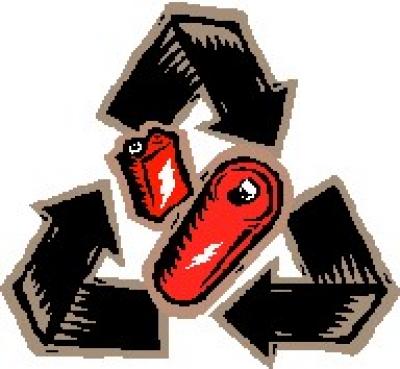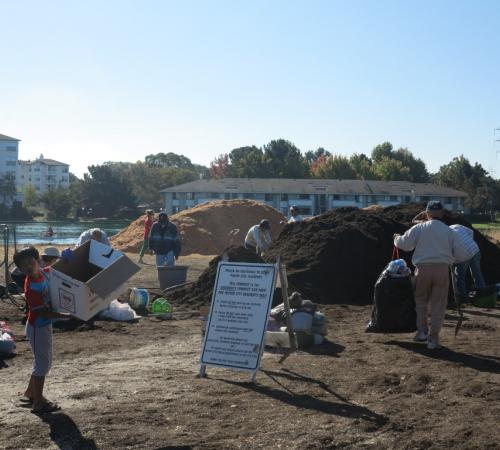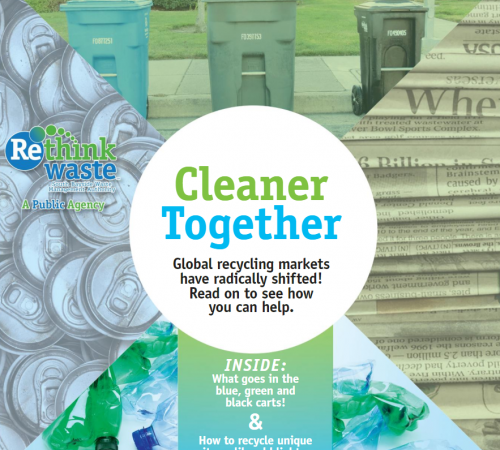Household Hazardous Waste Disposal
San Mateo County Household Hazardous Waste (HHW) Program
San Mateo County residents can make an appointment to drop off their Household Hazardous Waste at San Mateo County's HHW Program. Click here to learn more or to make an appointment.
Shoreway Environmental Center
Many items are accepted at the Public Recycling Center at the Shoreway Environmental Center in San Carlos, 333 Shoreway Road (Gate 1), including:
- Plastic bags or "film plastic" – any type of plastic bag that stretches when pulled (including shrink wrap, grocery bags, dry cleaning, produce, bread, and frozen food bags)
- Cardboard, mixed paper, glass, cans, and plastic containers
- Electronics (computers, TVs, cell phones, etc.)
- Household batteries
- Fluorescent light tubes (household only, six tubes per visit, must be less than six feet)
- Compact fluorescent lights (CFLs)
- Used motor oil filters
- Used motor oil (up to 15 gallons)
- Used motor antifreeze (up to 10 gallons)
- Car batteries
- Cooking oil (residential only - up to 15 gallons)
- Latex paint (up to 10 gallons)
- Scrap metal
- Sharps (must be in an authorized sharps container)
- Used clothing
- Working household goods
- Hard and soft cover books
- Expired or unwanted medications
Used Motor Oil and Filter Recycling
There are many resources for oil and oil filter recycling:
- Recology San Mateo County for residents of single family homes
- County of San Mateo Health Department
- San Mateo County Stormwater Pollution Prevention Program
PaintCare Program
PaintCare operates stewardship programs on behalf of paint manufacturers, making it easy to recycle leftover, unwanted paint. There are currently no PaintCare drop off locations in Foster City, however, there are a number of nearby locations in neighboring cities. To find a PaintCare location, click here.
City Hall
Batteries (household single use and rechargeable) and cell phones are accepted at City Hall from residents between the hours of 8:00 am and 5:00 pm, Monday through Friday excluding holidays. Foster City periodically hosts one-day e-waste collection events. View our Green Events flyer or follow us on social media for the dates and times.
San Mateo County Sustainability Department
Visit the San Mateo County Sustainability Department's website for more information on how to recycle household hazardous wastes such as motor oil, oil filters, antifreeze, car batteries, and latex paint.

How to Recycle Batteries, Cell Phones, and Fluorescent Lamps
All batteries, cell phones, and fluorescent lamps and tubes in California must be either recycled, taken to a household hazardous waste disposal facility, or taken to a universal waste handler (e.g., storage facility, broker) or an authorized recycling facility.
Batteries
All batteries are considered hazardous waste in California when they are discarded. This includes batteries of all sizes: AAA, AA, C, D, button cell, 9 Volt, rechargeable, single use, and all others. Batteries are considered hazardous because of the metals and/or other toxic or corrosive materials contained within. Batteries are potentially a valuable source of recyclable metal. Alkaline batteries, unless labeled low mercury, typically contain 1% mercury content. Although this amount seems small, due to the volume of batteries purchased and used, it can have serious impacts on the environment. Some estimates suggest that 88% of all mercury in the municipal solid waste stream is from ordinary non-rechargeable dry cell batteries such as the ordinary AAA, AA, C, D, button cell, and 9 Volt batteries.
cell phones
Cell phones contain toxic materials that threaten human health and the environment. Both batteries and cell phones are classified as Universal Waste and are banned from disposal with garbage and must be handled properly. To learn more about recycling batteries and cell phones, please visit RethinkWaste's website.
Did you know? Recology collects used household batteries and cellphones curbside. Place your recyclable materials in a sealed plastic bag on top of your blue recycle cart for collection.
Fluorescent Lamps
All fluorescent lamps and tubes are considered hazardous waste in California when they are discarded because they contain mercury. This includes fluorescent tubes, low mercury tubes, compact fluorescents (CFLs), and low mercury lamps. When mercury-containing lamps or tubes are placed in the trash and collected for disposal, the lamps or tubes are broken and mercury is released into the environment. Mercury vapors from broken lamps or tubes can be absorbed through the lungs into the bloodstream. People who are particularly close to the breakage are especially at risk. Mercury from broken lamps and tubes can also be washed by rainwater into waterways. All fluorescent lamps and tubes should be recycled. Please click here for a list of locations that accept fluorescent tubes and bulbs and safety tips for broken lights.



